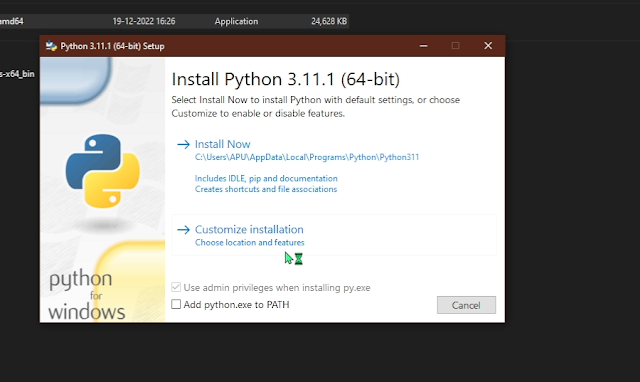First Program in Python | Roadmaps | Documents | Installation | Tutorials
Python Roadmap For Beginner
Here is a suggested roadmap for a beginner learning Python:
- Start by learning the basics of the language, such as:
- Variables
- Data types
- Control structures and Functions. You can find many resources online, such as tutorials and interactive exercises, to help you get started.
- Practice writing simple programs to solidify your understanding of the language. Some good exercises for beginners include writing a program that calculates the area of a circle or one that simulates a simple game.
- Learn about Python's built-in data structures, such as lists, tuples, and dictionaries, and how to manipulate them. You should also learn about loops and how to use them to iterate over these data structures.
- Learn about the Python standard library and how to use it to perform common tasks, such as reading and writing files, working with dates and times, and making HTTP requests.
- Learn about object-oriented programming in Python and how to create your own classes and objects.
- Learn about more advanced topics such as error handling, regular expressions, and decorators.
- Practice writing more complex programs that use multiple modules and packages.
- Learn about popular Python libraries such as NumPy, pandas, and scikit-learn for data analysis and manipulation.
- Learn about Python's web frameworks such as Django and Flask and how to build web applications using them.
- Continuously practice and build projects to improve your skill and to stay updated with the latest development in Python.
Remember, the key to learning any programming language is practice and patience. Keep at it and you will become proficient in no time!
Python As First Language:
Why You should choose python as you first programming language?
Python is a popular programming language that is widely used in the industry. It is known for its simplicity, readability, and versatility. This makes it an excellent choice for beginners who are just learning to code. In this article, we will discuss why Python is a great first programming language and what you can do with it.
First, Python's simplicity makes it easy to learn and understand. The language has a simple syntax that is easy to read and write. This allows beginners to focus on learning programming concepts rather than getting bogged down in the complexities of the language. Additionally, Python's wide range of libraries and modules make it easy to perform various tasks such as data analysis, web development, and machine learning.
Second, Python's versatility allows it to be used in many different fields. It is widely used in scientific research, data analysis, web development, and artificial intelligence. This makes it a great choice for beginners who are not sure what they want to do with their programming skills. With Python, you can explore different areas of computer science and find what interests you the most.
Finally, Python has a large and active community. This means that there are many resources available for learning and troubleshooting. There are countless tutorials, forums, and documentation available online to help beginners get started with Python. Additionally, the community is always working to improve and update the language, making it a great choice for beginners who want to stay current with the latest trends in programming.
In conclusion, Python is a great choice for beginners who are just learning to code. Its simplicity, versatility, and active community make it easy to learn and understand, and the wide range of libraries and modules make it a powerful tool for many different fields. With Python, beginners can explore different areas of computer science and find what interests them the most.




